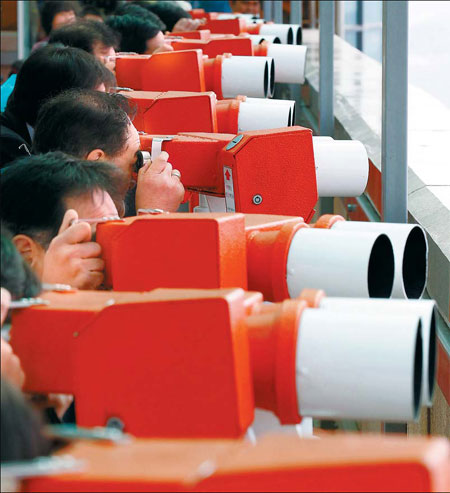Restraint urged after launch
 0 Comment(s)
0 Comment(s) Print
Print E-mail China Daily, April 14, 2012
E-mail China Daily, April 14, 2012
 |
| ROK residents look toward the DPRK with binoculars at the Unification Observatory near the demilitarized zone separating the two countries in Paju, north of Seoul, on Friday. [Kim Kyung-Hoon/Reuters] |
China has called for restraint after a failed satellite launch by the Democratic People's Republic of Korea on Friday morning.
The DPRK's official KCNA news agency said the satellite, Kwangmyongsong-3, was launched at 7:38 am on Friday and "failed to enter its preset orbit".
Scientists, technicians and experts were looking into the cause of the failure, it said.
China has expressed concerns over the launch and will continue communication with all sides, said Foreign Ministry spokesman Liu Weimin, adding that ambassadors from Tokyo and Seoul were at the ministry on Friday.
Liu said peace and stability of the Korean Peninsula and Northeast Asia are the responsibility of all sides, and asked parties to carefully deal with the matter together.
The 15-member United Nations Security Council scheduled an emergency meeting for later Friday.
Meanwhile, Washington said it was suspending plans to contribute food aid to Pyongyang in exchange for a rollback of its nuclear programs.
Regional tension has escalated dramatically since the DPRK's announcement of the satellite launch weeks ago.
But the fact that the DPRK invited up to 200 foreign journalists to cover the event on the ground - a clear, surprisingly high-profile gesture to reflect what it says are peaceful intentions in space - has laid the foundation for a possible shift in diplomacy, said Ruan Zongze, deputy director of the China Institute of International Studies.
"(The failure) is not necessarily a bad thing. There's increased transparency, and that ought to be encouraged," he said.
Reactions from the global community will by and large determine Pyongyang's next move, Ruan said, adding: "Overreaction may provoke the DPRK and corner it into further isolation."
The White House said Pyongyang's satellite launch, despite its failure, threatens regional security, violates international law and contravenes its own recent commitments.
Similarly, Japan's chief cabinet secretary, Osamu Fujimura, said the country has made a strict protest through diplomatic channels.
"Even if it was a failure, it is a grave provocation to our country," he said.
Worries had mounted that the DPRK may be using the opportunity to prepare for an atomic test, according to Wang Junsheng, an expert of Northeast Asian studies at the Chinese Academy of Social Sciences in Beijing.
Western critics see the launch as a ballistic missile test, which the DPRK has been banned from carrying out under UN Security Council Resolutions.
The United States, Japan and Republic of Korea will continue to use Pyongyang's satellite programs as an excuse to expand their anti-ballistic missile defense systems, said Ruan.
"Although the launch failed, these powers will still see the DPRK as an 'X factor' and try to deploy ABMs. This is something China doesn't want to see, because it will only militarize and spark conflict in the region," he said.
In any event, there had been a lot of hype over Pyongyang's actual launch capabilities, said Zhang Xiao'an, vice-president of the United Nations Association of China.
"China is concerned that DPRK-US relations, which had eased, may be dragged into a new vicious cycle and could even lead to an arms race," she said.






Go to Forum >>0 Comment(s)